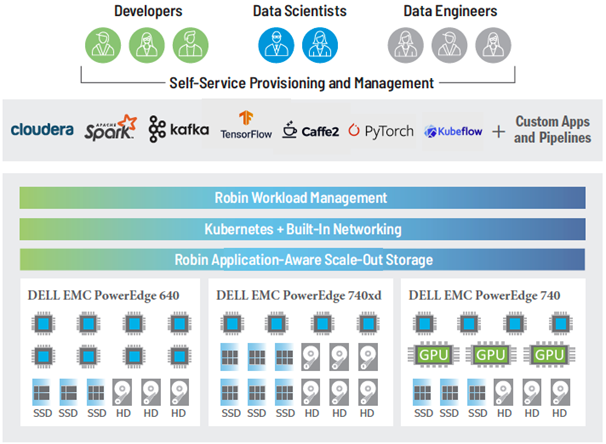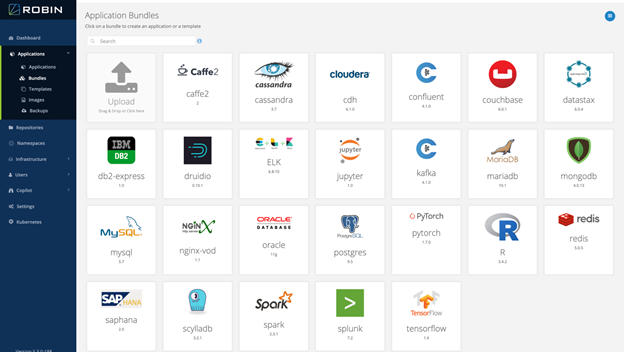The Robin Cloud Native Platform Solution Insight
Enabling IT to deliver data analytics-as-a-Service

Removing the barriers to hybrid-cloud flexibility for data analytics
Thu, 20 Jul 2023 17:00:57 -0000
|Read Time: 0 minutes
Introduction
The fundamental tasks of collecting data, storing data, and providing processing power for data analytics is getting more difficult. Increasing data volumes along with the number of remote data sources and the rapidly evolving options for extracting valuable information make forecasting needs challenging and investment risky. IT organizations need the ability to quickly provision resources and incrementally scale both compute and storage on-demand as need develops. The three largest hyper-scale cloud providers all offer a wide range of infrastructure, platform and analytics “as-a-service” but all require vastly different skill sets, security models, and connectivity investments. Organizations interested in having hybrid cloud flexibility for data analytics are forced to choose a single cloud partner or add significant IT complexity by managing multiple options with no common toolset. In this Solutions Insight, we describe how the Robin Cloud-Native Platform (CNP) hosted onsite with Dell EMC PowerEdge servers provide application and infrastructure topology awareness to streamline the provisioning and life cycle management of your data applications with true hybrid cloud flexibility.
 Architecture Diagram
Architecture Diagram
Providing a robust self-service experience
Data analytics professionals want easy access to internally managed provisioning of resources for experimentation and development without complex interactions with IT. Many of these professionals have experience with self-service portals that work for a single cloud service but have not yet had any hybrid cloud flexibility. Robin provides a rich out-of-the-box portal capability that IT can offer to developers, data engineers, and data scientists. Data professionals save valuable development time at each stage of the application lifecycle by leveraging the automation framework of Robin. IT gets a fully functional automation framework for hosting many popular enterprise applications on the Robin Platform. The Robin platform comes out-of-the-box with cluster-aware application bundles including relational databases, big data, NoSQL, and several AI/ML tools.
 Self Service Portal
Self Service Portal
Robin leverages cloud-native technologies such as Kubernetes and Docker to modernize the management of your data analytics infrastructure. The Robin Kubernetes-based architecture gives you complete freedom and offers a consistent self-service capability to provision and move workloads across private and/or public clouds. Native integration between Kubernetes, storage, network, and application management layer enables full automation managing both clusters and applications with all the advantages of a true hybrid cloud experience. Robin has built-in the capability to create managed application snapshots that enable cloning, backup, and migration of applications between on-prem and cloud or between datacenters within an enterprise. Robin fully automates the end-to-end cluster provisioning process for the most challenging platform deployments including Cloudera, Apache Spark, Kafka, TensorFlow, Pytorch, Kubeflow, Scikit-learn, Caffe, Torch, and even custom application configurations.
Organizations that adopt the Robin platform benefit from accelerated deployment and simplified management of complex applications that can be provisioned by end-users through a familiar portal experience and true hybrid cloud flexibility.
Moving from self-service sandboxes to enterprise scale
We described above how the Robin platform benefits both data and IT professionals that want a full-featured self-service data analytics capability with true hybrid cloud operations by layering additional platform awareness and automation to cloud-native technologies such as Kubernetes and Docker. Organizations can start with small deployments, and as applications grow, they can add more resources. Robin can be deployed on the full range of Dell EMC PowerEdge servers with a custom mix of memory, storage, and accelerator options making it easy to scale-out by adding additional servers with the right capabilities to match changing resource demands. The Robin management console provides a single interface to expand existing deployments and/or add new clusters. Consolidation of multiple workloads under Robin management can also improve hardware utilization without compromising SLAs or QoS. The Robin platform provides multi-tenancy with fine-grained Role Based Access Control (RBAC) enabling safe resource sharing on fewer clusters. Applications can be incubated on multi-tenancy, mixed application clusters and then easily migrated to production class clusters hosting one or multiple mission-critical applications using Robin backup and restore capability across clusters and/or clouds.
While open-source Kubernetes has become the de facto platform for deploying on-demand applications, there remains a need for additional investment by organizations that need multi-cluster production deployments and service orchestration that can automate and manage day-0 and day-n lifecycle operations at scale. The Robin Automation Platform combines simplicity, usability, performance, and scale with a modern UI to provide bare metal, cluster, and application-as-a-service for both infrastructure and service orchestration. With Robin Bare Metal-as-a-Service, hundreds of thousands of bare-metal servers can be provisioned with specific BIOS, firmware, OS and other software packages or configurations depending on the needs of the application. With Robin, it is equally easy to manage upgrades, as well as a wide array of PowerEdge server options including firmware, OS, and application software across container platforms.
Automating day-n operations for stateful applications
Several priorities are driving interest in running stateful applications on Kubernetes. These include operational consistency, extending agility of containerization to data, faster collaboration, and the need for simplifying the delivery of data services. Robin solves the storage and network persistency challenges in Kubernetes to enable its use in the provisioning, management, high availability and fault tolerance of mission-critical stateful applications.
Creating a persistent storage volume for a single container is becoming a routine operation. However, when it comes to provisioning storage for complex stateful applications that span multiple pods and services, it requires automation of the cluster resources coordinated with storage management. Managing the changing requirements of stateful applications on a day-to-day basis requires data and storage management services such as snapshotting, backup, and cloning. Traditionally, this capability has resided only on high-end storage systems managed by the IT storage administrator teams. In order to provide true self-service capabilities to data professionals, organizations need simple storage and data management solution for Kubernetes that hides all the above complexities and provides simple commands that are developer-friendly and can easily be incorporated into development and production workflows.
With Robin CNP, analytics and DevOps teams can be self-sufficient while managing complex stateful applications without requiring specific storage expertise. Data management is supported with a Robin managed CSI-compliant block storage access layer with bare-metal performance. Storage management seamlessly integrates with Kubernetes-native administrative tooling such as Kubectl, Helm Charts, and Operators through standard APIs.
Robin CNP simplifies storage operations such as provisioning storage, ensuring data availability, maintaining low latency I/O performance, and detecting and repairing disk and I/O errors. Robin CNP also provides simple commands for data management operations such as backup/recovery, snapshots/rollback, and cloning of entire applications including data, metadata, and application configuration.
Robin CNP offers several improvements on the networking layer over open-source Kubernetes. These improvements are required to run enterprise-scale data and network-centric applications on Kubernetes. With Robin CNP developers/IT can set networking options while deploying applications and clusters in Kubernetes and preserve IP addresses during restarts and application migration. Robin’s flexible networking built on OVS and Calico supports overlay networking. Robin also supports dual-stack (IPV4/IPV6).
Summary
IT organizations adopting the Robin platform benefit from a single approach to application and infrastructure management from experimentation to dev/test to a production environment that can span multiple clouds. Robin excels at managing heterogeneous infrastructure assets with a mix of compute, storage, and workload accelerators that can match the changing needs of fast-moving enterprise-wide demand for resources. Dell Technologies provides a wide range of PowerEdge rack servers with innovative designs to transform IT and maximize performance across the widest range of applications. PowerEdge servers match well with the three main types of infrastructure assets typically needed for a Robin managed implementation:
Compute Intensive | Storage Dense | Accelerator Enabled |
PowerEdge 640 | PowerEdge 740xd | PowerEdge 740 |
The PowerEdge R640 is the ideal dual-socket platform for dense scale-out data center computing. | The PowerEdge R740xd delivers a perfect balance between storage scalability and performance. The 2U two-socket platform is ideal for software defined storage. | The PowerEdge R740 was designed to accelerate application performance leveraging accelerator cards and storage scalability. The 2-socket, 2U platform has the optimum balance of resources to power the most demanding environments. |
Up to two 2nd Generation Intel® Xeon® Scalable processors, up to 28 cores per processor | Up to 24 NVMe drives and a total of 32 x 2.5” or 18 x 3.5” drives in a 2U dual-socket platform. | The scalable business architecture of the R740 can scale up to three 300W or six 150W GPUs, or up to three double-width or four single-width FPGAs |
24 DDR4 DIMM slots, Supports RDIMM /LRDIMM, speeds up to 2933MT/s, 3TB max Up to 12 NVDIMM, 192 GB Max Up to 12 Intel® Optane™ DC persistent memory DCPMM, 6.14TB max, (7.68TB max with DPCMM + LRDIMM) | Front bays: Up to 24 x 2.5” SAS/SATA (HDD/SSD), NVMe SSD max 184.32TB or up to 12 x 3.5” SAS/SATA HDD max 192TB Mid bay: Up to 4 x 2.5”, max 30.72TB SAS/SATA (HDD/SSD), or up to 4 x 3.5” SAS/SATA HDD, max 64TB Rear bays: Up to 4 x 2.5”, max 30.72TB SAS/SATA (HDD/SSD), or up to 2 x 3.5” SAS/SATA HDD max 32TB |
|
Robin is the ideal platform for hosting both stateful and stateless applications with support for both virtual machines and Docker-based applications. It includes a storage layer that provides data services, including snapshots, clones, backup/restore, and replication that enable hybrid cloud and multi-cloud operations for stateful applications that are not possible with pure open-source cloud-native technologies. It also includes a networking layer that supports carrier-grade networking OVS, Calico, VLAN, Overlay networking, Persistent IPs, Multiple NICs, SR-IOV, DPDK, and Dual-stack IPv4/IPv6
With the Robin platform on Dell EMC PowerEdge servers, organizations can:
· Decouple and scale compute and storage independently
· Provision/Decommission compute only clusters within minutes for ephemeral workloads
· All operations can be fully integrated with simple API commands from your development and/or production workflows.
· Migrate data workloads among data centers and public clouds
· Provide self-service capability for developers and data scientists to improve productivity
· Eliminate planning delays, start small and dynamically scale-up/out nodes to meet demand
· Consolidate multiple workloads on shared infrastructure to improve hardware utilization
· Trade resources among application clusters to manage cyclical compute requirements and surges
This results in,
· Reduced Costs
· Delivering faster insights
· Future-proofing the enterprise
For more information
Dell Technologies and Robin Systems welcome your feedback on this article and the information presented herein. Contact the Dell Technologies Solutions team by email.
You can also contact our regional sales teams for more information via email at the following addresses:
North America: analytics.assist@dell.com
LATAM: readysolutions.latam@dell.com
EMEA: EMEA_BigData_Team@dell.com
Thank you for your interest.

